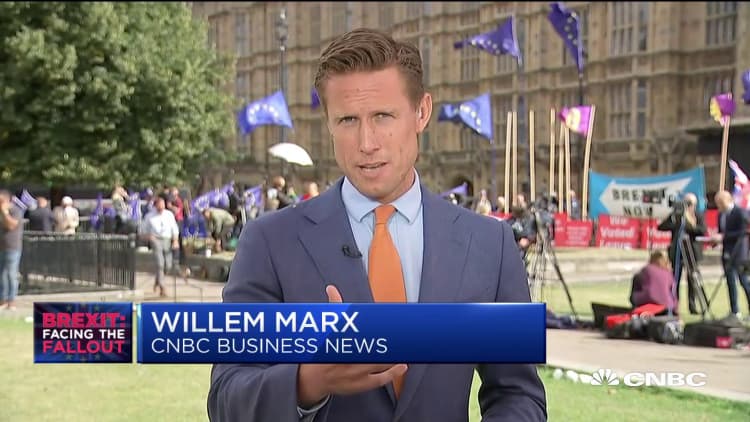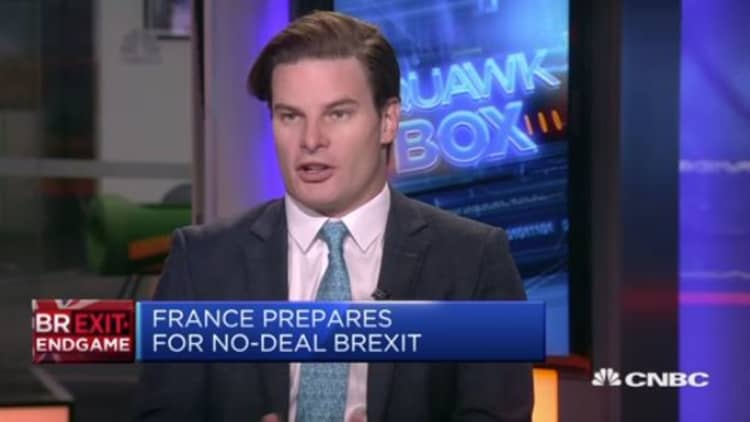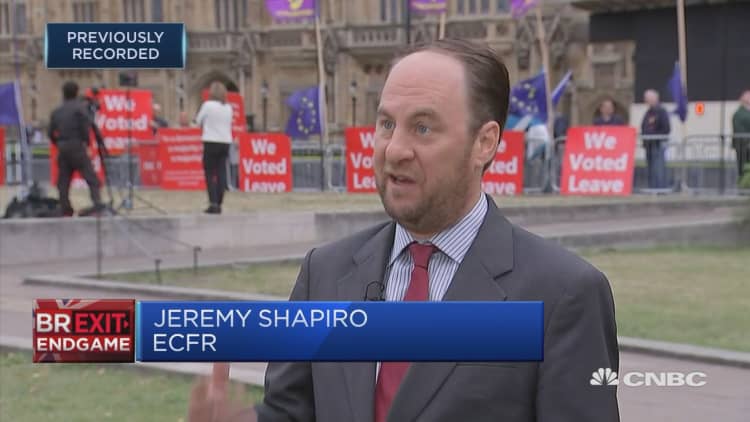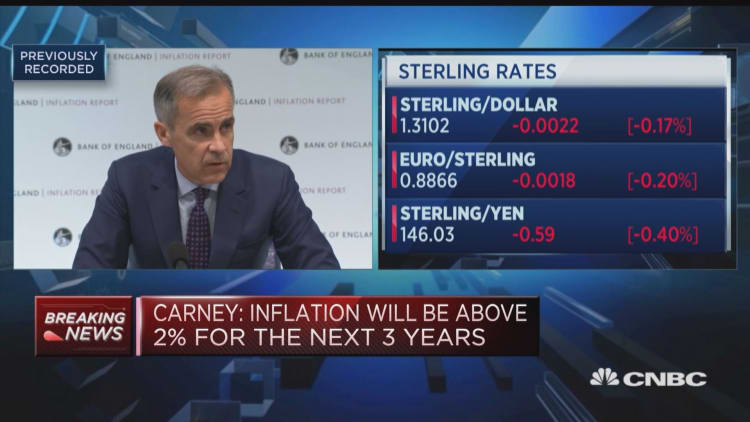Leaving the European Union without a deal will not represent a clean break for the U.K., but rather usher in a period of prolonged and severe uncertainty for years to come, according to a new report.
The report from academic think tank, The U.K. in a Changing Europe, based out of King's College London, contends that once the U.K. is out of the Article 50 framework, the legal mechanism which triggered the departure process, securing new terms with the bloc will become much harder and more prolonged.
This is because all 27 member states' national and sub-national parliaments would need to ratify any deal, and the EU would be unlikely to begin negotiating a future relationship until major issues with the current withdrawal agreement have been resolved.
The EU could also withdraw unilateral mitigations on logistical issues such as road or air transport which have been put in place during the Article 50 negotiation process, should Britain refuse to pay a £39 billion ($46.9 billion) divorce bill associated with leaving the bloc.

British lawmakers are currently embroiled in a historic battle over the prospect of a no-deal Brexit, with a cross-party coalition seeking legislation to block Prime Minister Boris Johnson taking Britain out without a new withdrawal agreement on October 31.
Professor Anand Menon, who led the research, said in a statement that while "the immediate impact might not be as severe as some people are claiming," leaving without a deal will have "significant negative consequences for the U.K. economy."
"Nor will it mark the end of Brexit, merely herald in the start of negotiations that promise to be significantly more difficult than those we have witnessed to date," he added.
Short-term impact
Should the U.K. leave without a deal, the imposition of tariff and non-tariff barriers between the U.K. and its largest trading partner will be a major shock to the economy, the report highlights, while the continued fall in the pound will drive up inflation and reduce real wages.
However, disruption on day one may not be as immediate and visible as predicted, given the contingency plans which have been implemented by the government and businesses. But although the financial system may not collapse, the report suggested that a recession is "highly probable."
The academics anticipate that the U.K. economy will eventually adjust to the new realities of life outside the EU, but trading with the EU on World Trade Organization (WTO) terms, over the course of 10 years, would reduce Britain's income per capita by between 3.7% and 8.7%.
The extent of the recession will depend on the extent of direct trade disruption, impact on consumer and business confidence and effectiveness of government and Bank of England policy response, the report said.

However, impact on trade would be immediate with new regulatory and customs arrangements coming into force immediately on November 1.
New border checks and tariffs overnight would disrupt around half of all U.K. goods exports, particularly in the automotive and manufacturing sectors on account of their "just-in-time" production systems. The report cites the likes of Airbus, Toyota and Jaguar Land Rover as particularly susceptible even to minor delays at the border.
Long-term problems are predicted for the health and financial services sectors also, along with particular problems for Northern Ireland, both in terms of economic obstacles and political, social and security challenges which may arise.
"The speedy reintroduction of border controls for goods moving to Ireland would mean a decrease in exports, the curtailment of supply chains in key industries, and an increase in black market activity. Unemployment would rise. There would be a very real possibility of a return to direct rule from London, undermining the Good Friday Agreement," the academics said.
The UK will immediately lose access to EU databases and other forms of co-operation including the European Arrest Warrant, the Schengen Information System and Europol. This will hinder policing and security operations, including those currently ongoing.
Meanwhile, the coordination of social security, on which cross-border healthcare rests, will immediately cease, which means planned treatment in other member states will be disrupted. The European Health Insurance Card (EHIC) for emergency treatment will no longer function.
No-deal does not end the Brexit process
Although widely characterized by pro-Brexit lawmakers and commentators as a clean break following three years of arduous negotiations, the report contends that a no-deal Brexit is highly unlikely to mark an end state for the U.K.'s relationship with the EU.
The longer term impacts would instead depend on the speed and terms with which the two sides return to the negotiating table.
"It is likely that future negotiations would be acrimonious and that the UK's negotiating position could be significantly weaker," the report adds.
The academics also conclude that it would take years to resolve long-term arrangements for key economic rights of U.K. citizens abroad, including on issues such as healthcare and social security, and that a bespoke future security arrangement would also take years to negotiate. The report points to the Europol-Norway agreement, which took seven years to complete.

The U.K. has made progress in rolling over the agreements it has with third party countries via the EU, but the long term economic benefits are negligible.
"The EU accounts for around half of U.K. trade, more than three times as much as the U.K.'s second largest trade partner - the United States," the report highlights.
"Second, standard free trade agreements do less to reduce trade barriers than the deep integration that is the hallmark of the EU single market. The government's own analysis said that, even on optimistic assumptions about the number of deals that could be concluded over the next decade, the impact would be very small: overall, new trade deals could boost GDP by between 0.2% and 0.7% in the long term."
The report concludes that the impact of a no-deal Brexit will be "significant, damaging and long-lasting, albeit not as immediate and visible as some earlier reports have suggested."
"Perhaps most importantly, there is no sense in which no deal will give governments, businesses or households 'certainty', either in the U.K. or in the EU. No deal will not be the end of Brexit as the central political issue in the UK, or even the beginning of the end. When the dust clears, however, it may be – in the words of Winston Churchill – the end of the beginning," it states.

In its July Financial Stability Report, the Bank of England said the British banking system was ready to withstand a no-deal exit, but suggested such a scenario could trigger a material shock to the U.K. economy and widespread cross-border disruption for companies.
Following its latest Monetary Policy Committee (MPC) meeting, BOE governor Mark Carney said the U.K. crashing out without a deal would cause an "instantaneous shock" to the economy, including a sell-off in the pound, rising inflation and slowing GDP growth. The central bank assumed Britain would avoid such a shock, but assigned a 33% probability of the U.K. entering recession by the end of the first quarter of 2020 even if a Brexit deal is reached.
A report from the United Nations (UN) trade agency UNCTAD, published Tuesday, projected that a no-deal Brexit would cost Britain at least $16 billion in lost EU sales, and possibly far more once indirect effects and other markets were accounted for.
That would include $5 billion in motor vehicle exports, $2 billion in animal products and a further $2 billion in apparel and textiles.
UNCTAD said the $16 billion figure was conservative, accounting only for a rise in EU tariffs from zero to the basic "most favored nation" rate that it offers countries without preferential deals.

